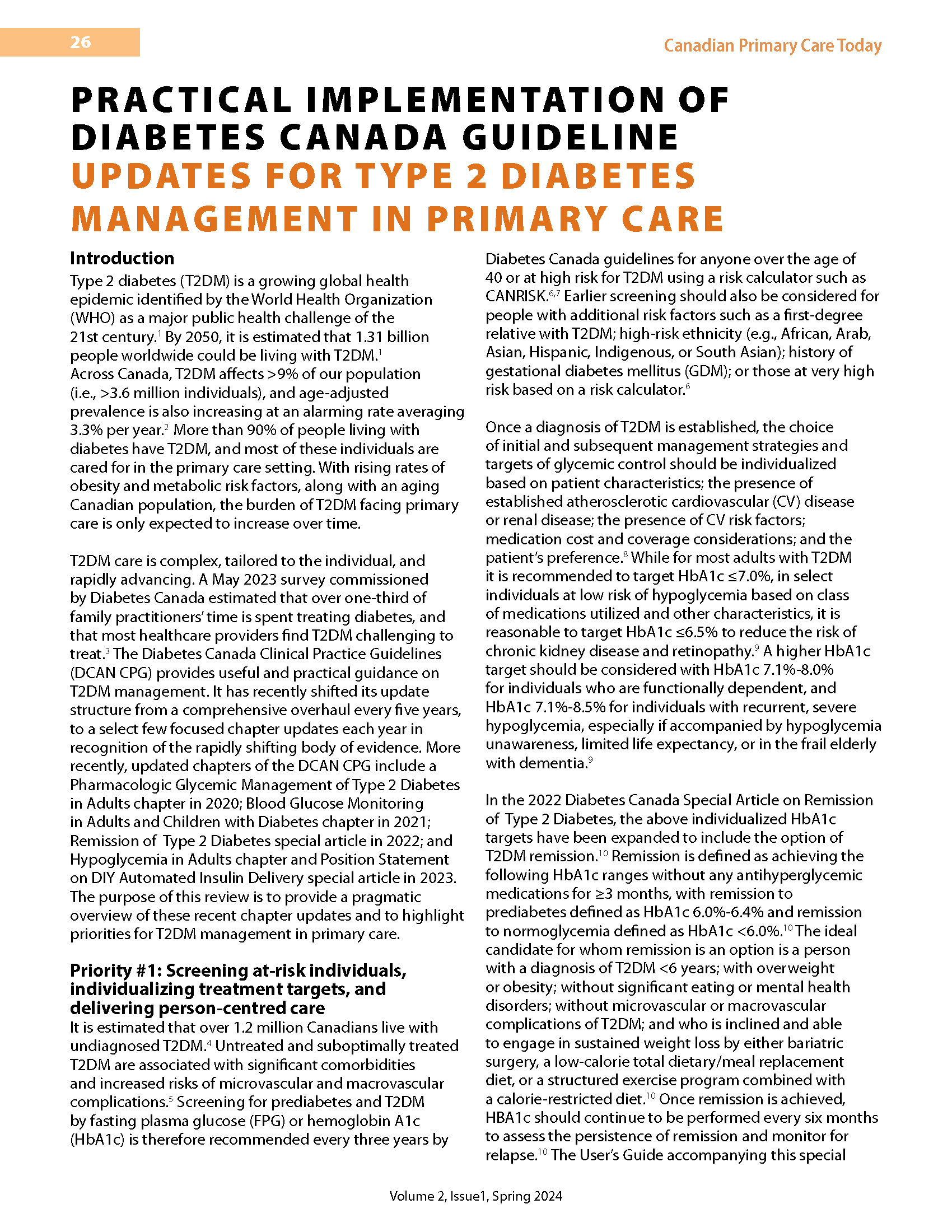Practical Implementation of Diabetes Canada Guideline Updates for Type 2 Diabetes Management in Primary Care
DOI:
https://doi.org/10.58931/cpct.2024.2126Abstract
Type 2 diabetes (T2DM) is a growing global health epidemic identified by the World Health Organization (WHO) as a major public health challenge of the 21st century.1 By 2050, it is estimated that 1.31 billion people worldwide could be living with T2DM. Across Canada, T2DM affects >9% of our population (i.e., >3.6 million individuals), and age-adjusted prevalence is also increasing at an alarming rate averaging 3.3% per year. More than 90% of people living with diabetes have T2DM, and most of these individuals are cared for in the primary care setting. With rising rates of obesity and metabolic risk factors, along with an aging Canadian population, the burden of T2DM facing primary care is only expected to increase over time.
T2DM care is complex, tailored to the individual, and rapidly advancing. A May 2023 survey commissioned by Diabetes Canada estimated that over one-third of family practitioners’ time is spent treating diabetes, and that most healthcare providers find T2DM challenging to treat.3 The Diabetes Canada Clinical Practice Guidelines (DCAN CPG) provides useful and practical guidance on T2DM management. It has recently shifted its update structure from a comprehensive overhaul every five years, to a select few focused chapter updates each year in recognition of the rapidly shifting body of evidence. More recently, updated chapters of the DCAN CPG include a Pharmacologic Glycemic Management of Type 2 Diabetes in Adults chapter in 2020; Blood Glucose Monitoring in Adults and Children with Diabetes chapter in 2021; Remission of Type 2 Diabetes special article in 2022; and Hypoglycemia in Adults chapter and Position Statement on DIY Automated Insulin Delivery special article in 2023. The purpose of this review is to provide a pragmatic overview of these recent chapter updates and to highlight priorities for T2DM management in primary care.
References
Global, regional, and national burden of diabetes from 1990 to 2021, with projections of prevalence to 2050: a systematic analysis for the Global Burden of Disease Study 2021 - The Lancet [Internet]. [cited 2023 Dec 23]. Available from: https://www.thelancet.com/journals/lancet/article/PIIS0140-6736(23)01301-6/fulltext
Canadian Chronic Disease Surveillance System (CCDSS) [Internet]. [cited 2023 Dec 23]. Available from: https://health-infobase.canada.ca/ccdss/data-tool/Index?G=00&V=1&M=4&Y=2017
Diabetes Canada. Clinical Practice Guidelines Knowledge Research. 2023 May.
Rosella LC, Lebenbaum M, Fitzpatrick T, Zuk A, Booth GL. Prevalence of prediabetes and undiagnosed diabetes in Canada (2007-2011) according to fasting plasma glucose and HbA1c Screening Criteria. Diabetes Care. 2015 Jul;38(7):1299–305. DOI: https://doi.org/10.2337/dc14-2474
Valencia WM, Florez H. How to prevent the microvascular complications of type 2 diabetes beyond glucose control. BMJ. 2017 Jan 17;356. DOI: https://doi.org/10.1136/bmj.i6505
Ekoe JM, Goldenberg R, Katz P. Screening for diabetes in adults. Can J Diabetes. 2018 Apr;42–9. DOI: https://doi.org/10.1016/j.jcjd.2017.10.004
Diabetes, Type 2—CANRISK – Canadian Task Force on Preventive Health Care [Internet]. [cited 2023 Dec 26]. Available from: https://canadiantaskforce.ca/tools-resources/type-2-diabetes-2/type-2-diabetes-canrisk/
Lipscombe L, Butalia S, Dasgupta K et al. Pharmacologic glycemic management of type 2 diabetes in adults: 2020 update. Can J Diabetes. 2020 Oct;44(7):575–91. DOI: https://doi.org/10.1016/j.jcjd.2020.08.001
Imran SA, Agarwal G, Bajaj HS et al. Targets for glycemic control. Can J Diabetes. 2018 Apr;42–6. DOI: https://doi.org/10.1016/j.jcjd.2017.10.030
MacKay D, Chan C, Dasgupta K et al. Remission of type 2 diabetes. Can J Diabetes. 2022 Dec;46(8):753-761.e8. DOI: https://doi.org/10.1016/j.jcjd.2022.10.004
Jin S, Bajaj HS, Brazeau AS et al. Remission of type 2 diabetes: user's guide. Can J Diabetes. 2022 Dec;46(8):762–74. DOI: https://doi.org/10.1016/j.jcjd.2022.10.005
Husain M, Birkenfeld AL, Donsmark M et al. Oral semaglutide and cardiovascular outcomes in patients with type 2 diabetes. N Engl J Med. 2019 Aug 29;381(9):841–51. DOI: https://doi.org/10.1056/NEJMoa1901118
McGuire DK, Busui RP, Deanfield J et al. Effects of oral semaglutide on cardiovascular outcomes in individuals with type 2 diabetes and established atherosclerotic cardiovascular disease and/or chronic kidney disease: Design and baseline characteristics of SOUL, a randomized trial. Diabetes Obes Metab. 2023 Jul;25(7):1932–41.
Dahl D, Onishi Y, Norwood P et al. Effect of subcutaneous tirzepatide vs placebo added to titrated insulin glargine or glycemic control in patients with type 2 diabetes. The SURPASS-5 randomized clinical trial. JAMA. 2022 Feb 8;327(6):534–45. DOI: https://doi.org/10.1001/jama.2022.0078
Nicholls SJ, Bhatt DL, Buse JB et al. Comparison of tirzepatide and dulaglutide on major adverse cardiovascular events in participants with type 2 diabetes and atherosclerotic cardiovascular disease: SURPASS-CVOT design and baseline characteristics. Am Heart J. 2024 Jan;267:1–11. DOI: https://doi.org/10.1016/j.ahj.2023.09.007
Empagliflozin in patients with chronic kidney disease | NEJM [Internet]. [cited 2023 Dec 31]. Available from: https://www.nejm.org/doi/full/10.1056/NEJMoa2204233
Canagliflozin and renal outcomes in type 2 diabetes and nephropathy | NEJM [Internet]. [cited 2023 Dec 31]. Available from: https://www.nejm.org/doi/full/10.1056/nejmoa1811744
Dapagliflozin in patients with heart failure and reduced ejection fraction | NEJM [Internet]. [cited 2024 Jan 2]. Available from: https://www.nejm.org/doi/full/10.1056/NEJMoa1911303
Dapagliflozin in patients with chronic kidney disease | NEJM [Internet]. [cited 2023 Dec 31]. Available from: https://www.nejm.org/doi/full/10.1056/NEJMoa2024816
Brown E, Heerspink HJL, Cuthbertson DJ et al. SGLT2 inhibitors and GLP-1 receptor agonists: established and emerging indications. Lancet. 2021 Jul 17;398(10296):262–76. DOI: https://doi.org/10.1016/S0140-6736(21)00536-5
Marx N, Husain M, Lehrke M et al. GLP-1 receptor agonists for the reduction of atherosclerotic cardiovascular risk in patients with type 2 diabetes. Circulation. 2022 Dec 13;146(24):1882–94. DOI: https://doi.org/10.1161/CIRCULATIONAHA.122.059595
Harris SB, Cheng AYY, Davies MJ et al. Person-centered, outcomes-driven treatment: a new paradigm for type 2 diabetes in primary care [Internet]. Arlington (VA): American Diabetes Association; 2020 [cited 2023 Dec 31]. Available from: http://www.ncbi.nlm.nih.gov/books/NBK559432/ DOI: https://doi.org/10.2337/db2020-02
Lega IC, Yale JF, Chadha A et al. Hypoglycemia in adults. Can J Diabetes. 2023 Oct;47(7):548–59. DOI: https://doi.org/10.1016/j.jcjd.2023.08.003
Robinson DJ, Hanson K, Jain AB et al. Diabetes and mental health. Diabetes. 2023 Jun;47(4):308–44. DOI: https://doi.org/10.1016/j.jcjd.2023.04.009
Diabetes Canada Clinical Practice Guidelines Expert Committee, Feig DS, Berger H, Donovan L et al. Diabetes and Pregnancy. Can J Diabetes. 2018 Apr;42 Suppl 1–82. DOI: https://doi.org/10.1016/j.jcjd.2017.10.038
Meneilly GS, Knip A, Miller DB et al. Diabetes in older people. Can J Diabetes. 2018 Apr;42–95 DOI: https://doi.org/10.1016/j.jcjd.2017.10.021

Published
How to Cite
Issue
Section
License
Copyright (c) 2024 Canadian Primary Care Today

This work is licensed under a Creative Commons Attribution-NonCommercial-NoDerivatives 4.0 International License.
